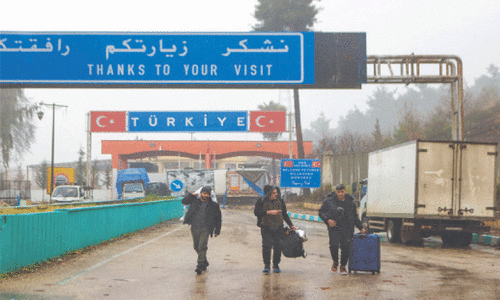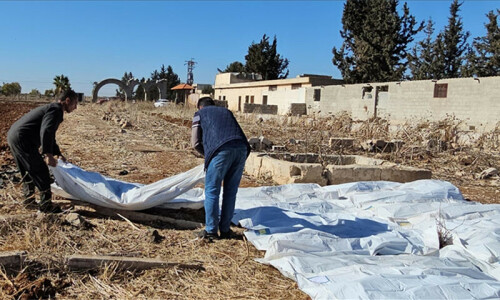The cover of Michael Deibert’s examination of Congo bears a striking image of a young woman in flip-flops playing the cello in a bleak, grubby yard surrounded by a bleak, grubby city. She focuses on the notes on a sheet music stand, seemingly oblivious to the potholes and grime and rain-bellied clouds overhead.
It is an apt illustration for a book subtitled “Between Hope and Despair”, and invites us to wonder if harmony will finally prevail in a country eviscerated by two decades of conflict and chaos.
This ought to be one of the great, burning questions of international diplomacy. The carnage has caused 5.4 million deaths, by some estimates, and the toll continues to climb. Fighting in the east last year spilled into Rwanda.
Deibert’s book is a scrupulously researched reminder of how this corner of the world became so wretched, and of the multiple actors responsible: Congolese politicians and warlords, predatory neighbours, hypocritical western governments and a hapless UN.
“Though far from a paradise before the advent of Europe’s colonial adventure there,” he writes, “Congo became a place as deeply scarred and deformed by colonialism as any in Africa, and the bloodshed that has befallen the country since then is not the result of some sort of indigenous, irresistible, immemorial bloodlust on the part of the Congolese, but rather has been a tool used by individuals and governments to advance their own political and economic goals.”
A vast land stretching from the Atlantic across jungles and savannah to Lake Tanganyika, touching nine countries, the Democratic Republic of the Congo abounds in timber, minerals and precious stones. These riches have been a curse, drawing parasitic interlopers who ravaged and impoverished Congo under various names: the Congo Free State, Belgian Congo, Zaire, DRC.
The depredations have long inspired and appalled chroniclers. Joseph Conrad’s Heart of Darkness and Roger Casement’s diaries exposed King Leopold’s vampiric tyranny. More recently Adam Hochschild (King Leopold’s Ghost), Michela Wrong (In the Footsteps of Mr Kurtz) and Tim Butcher (Blood River) have delved into the moral murk and returned with literary gems. Mario Vargas Llosa visited Congo to research The Dream of the Celt, a fictionalised account of Casement’s life published in 2012.
Deibert’s book eschews literary pretensions. A globetrotting American freelancer who specialises in development issues in Africa, Latin America and the Caribbean, he has written a solid, journalistic account detailing Congo’s tailspin since 1994.
Early chapters briskly dispatch the history — Portuguese slavers, Belgian hand-cutters, Mobutu Sese Seko’s decaying rule — leaving the book to focus on what happened after Rwanda’s vengeful Tutsi forces pursued Hutu genocidaires across the border of its giant neighbour.
Drawing on reports from Global Witness and Human Rights Watch, among others, Deibert details how Rwanda’s proxy warlord, Laurent Kabila, swept aside Mobutu’s ramshackle regime and installed himself in the presidential palace in Kinshasa.
Bill Clinton, shamed by his inaction during Rwanda’s genocide, compensated by turning a blind eye to atrocities committed by forces loyal to Kabila and his Rwandan puppet-master Paul Kagame.
That set a trend for western coddling of Kagame that lasted two decades despite repression in Rwanda and catastrophic tampering in Congo.
As the Guardian’s Africa correspondent from 2002 until 2006 I would interview massacre survivors in Goma and Bukavu, then interview western diplomats in Kigali and Kinshasa who would nod and sigh and mumble excuses. A complex situation. Multiple variables. Powder keg. Better Kagame’s iron fist than anarchy.
Deibert makes a few fleeting appearances in the text such as when he encounters “bones still bleaching in the sun” in Bogoro, five years after a massacre, or visits the assassinated Kabila’s tomb, built by his son and successor, Joseph Kabila.
Mostly the author keeps himself out of it, a restraint alien to the I-swam-the-crocodile-river school of Congo reportage, and sticks to the facts, layering the narrative with details about which group or sub-group committed which killings.
The cumulative effect is numbing. Here is the RCD-N killing and raping this ethnic group. Now it’s the UPC killing and raping that ethnic group. Then it’s the turn of the APC. Then the FRPI, the FNI, the RCD-G. Even with footnotes it can become bewildering. Which lot are they again?
Congo’s horrors have arguably inspired too much lyrical prose at the expense of factual accounts giving you straight analysis, and here lies the value of this book, an up-to-date synopsis which should adorn the shelf of policymakers and analysts.
But as acronym bleeds into acronym the general reader will yearn for some storytelling, for some characters to humanise the statistics and give a flash of Congolese culture, humour and music.
These are surprising omissions as this is, quite rightly, an angry book. From his writings elsewhere Deibert is in the mould of James Cameron. Compassion impels his curiosity.
The US and some European countries have belatedly recognised Kagame’s duplicity but Deibert offers scant reason for the hope in his book’s title. He doubts the international criminal court’s prosecution of a few warlords at the Hague will deter others. For kleptocrats and meddlers, Congo, alas, remains open for business.—By arrangement with the Guardian














































Dear visitor, the comments section is undergoing an overhaul and will return soon.